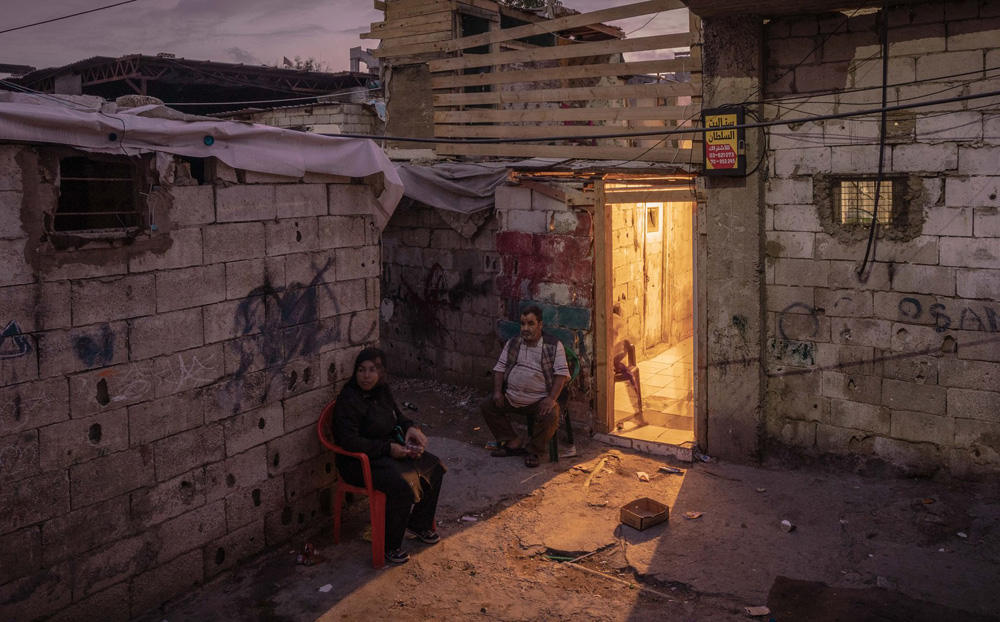Aboodi Ziani appears to be someone you could size up fairly quickly in “In the Shadow of Beirut,” relegated to Lebanon’s poorest district where he raises a child with his wife Suzanne. Having served time from prison for drugs and armed robbery at various points in his still relatively young life, he doesn’t dissuade anyone from thinking he’s left that life behind with his appearance, burly and bearded as he works at a tattoo parlor, putting as much ink on others as he has on himself. However, he’d be the first to tell you, as he confides to co-directors Stephen Gerard Kelly and Garry Keane, that he’d rather work anywhere else if he had the opportunity, prevented from having a passport or a driver’s license by his criminal record and unlikely to have any job applications even make it past an immediate supervisor.
He isn’t the only one without an ID Kelly and Keane find in Shatila and Sabra, two areas rarely visited by most living Beirut, let alone by film crews from abroad, but by the end of their heartrending chronicle of life in the region, they don’t let anyone go unrecognized. As a practical matter, the fact that the poverty-stricken in these parts can’t attain proper paperwork has a chilling effect on their lives, limited in their movement when they avoid any basic interaction with authorities and unable to pursue public services. An area comprised largely of those living in exile from nearby Palestine or Syria, the residents have gone through immeasurable hardship already, yet find themselves packed like sardines into one square kilometer that has become the home of thousands, making the feeling of anonymity an accepted part of daily life. But in following four families over the course of four years, the film reveals a remarkable capacity to endure under such dire conditions as it does the needless obstacles they face.
Kelly and Keane present stories of survival, but go one step further in considering the fraught social and economic dynamics that guide each difficult decision they have to make, from a mother who has to send out her prepubescent son out onto the street to collect trash for cash when she’d prefer to send him to school if it was an option, to a father whose decided the best way forward for his family is to marry off their 13-year-old daughter Sanaa despite her wishes. Having various members of the family share their perspective on events as they unfold on screen gives an understanding to an otherwise unfathomable situation where the families are constantly attempting to make the best choice out of a host of bad ones in front of them and while Lebanon faces broader threats from the 2020 Port explosion and the coronavirus that spread during the filmmakers’ time there, the film shows the extremely precarious place the country is currently in where there’s no time to build towards a future as just maintaining in the present takes up so much time and energy.
After a celebrated festival run that culminated in Ireland selecting the film as its official Oscar entry for last year’s awards, “In the Shadow of Beirut” is now finally available for all to see on VOD and recently Kelly and Keane graciously took the time to talk about how a major decision for Kelly personally led to this professional triumph, what it was like to collaborate on a film like this, given Keane’s experience with the 2019 film “Gaza,” and finding a unique way to observe life in the region and bringing it to the screen.
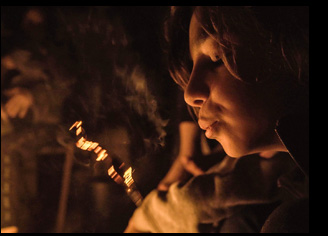
Stephen Gerard Kelly: Yeah, I knew I was onto a good thing with my partner and family and friends both told me, “Don’t lose her. She’s a good one.” So when she took a job in Beirut in 2015, I packed up my bags in New York City where I’d been living for five years and I followed her over to the unknown. We had talked about where she might be moving to and Beirut was one of the options because of its fascinating society, politics, and what was going on in nearby Syria. At the time, it was attractive to me from that point of view.
And I had an inquisitive nature to explore the entire city. I bought a used mountain bike and proceeded to just roll around my new home. After a few weeks, I rode into Sabra and I noticed immediately how it looked differently from other parts of the city and I struck up a bit of a conversation with a fruit stall owner there who took a shine to me and me to him. We developed a friendship from that and then he effectively pulled me into the family home over the subsequent weeks and months. His mother, an elderly lady, took me in as a newcomer in the city and not knowing the language and not having friends or family there. They became my family and my dear friends and then through that family over years, I got to know the communities of Sabra and Shatila very well and the people who live there.
Myriam Sassine, one of your producers based in Lebanon, said she came onto the film because she was impressed with how well you spoke Arabic. So you didn’t actually know the language from the start?
Stephen Gerard Kelly: I didn’t have any Arabic when I moved there, but Arabic is the main language spoken in Sabra and Shatila. And in that family [I embedded with], nobody spoke English. So I really had to learn the the language and then I complimented that with going to Arabic classes as well with tutors who helped me develop that, so Myriam and other Lebanese people, both on the filmmaking team and in general, when they hear me speak Arabic, it’s a bit of a surprise to them. The accent more than anything, because when somebody from Dublin speaks Arabic, it often raises a smile.
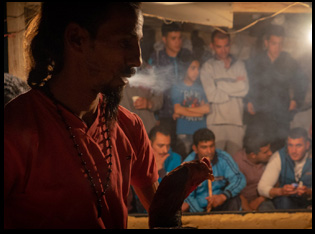
Garry Keane: Stephen got my name and said he’d been shooting some material in Sabra in Shatila for some years and asked me would I take a look at it. We did and it was great. We formed an alliance and decided that we’d try and make a film out of it, so we put the team together with the producer that I worked with on “Gaza” and we got going. Stephen and myself then made a couple of trips back to to Sabra and Shatila to join the dots and make the stories work. It was a very interesting collaboration and it’s a film we’re very proud of.
Stephen Gerard Kelly: Being brutally honest, it was a case of not being able to tell the wood from the trees after being there for so many years and filming with 10 families. You see on screen the four families that made it in to the film and I was very involved in people’s lives there, so when it came to explaining the story to somebody else, be it to Garry, Brendan Byrne, the producer, or the Lebanese production team or the editor, there was just so much in the universe there that I really had to team up with the likes of Garry, who brought a very clear storytelling head to it and helped me to distill down what would work on the screen.
I would have backstories of backstories and peripheral characters, but in the end, all of that couldn’t make it into the film. So when we went into the edit, Garry helped me to put a narrative structure on it, which I learned a lot from, and I’m forever grateful. The stronger characters naturally came to the fore and ultimately that’s only a fraction of what I saw because the camera was only on a small percentage of the time and it was never for me about the camera, at least initially. I didn’t go into it looking to make a film in my first few years there, but being inspired and helped by the team meant that it became a reality.
There’s a really elegant approach to the storytelling in that there are no sit-down interviews, but you’ll hear various members of the families you follow speaking over the verite footage you have of them so you’ll get their perspective. How did that become the format?
Garry Keane: It would be something that I do in the films I make. We had a similar approach in the edit style of “Gaza” [where] I try and limit the amount of on-screen interviews. But Stephen also liked that approach. We did a few interviews on camera, not very much of that ended up in the film, but for the most part, we tried to let the story evolve through the pictures and through the moments that were captured and we were very happy with how that evolved.
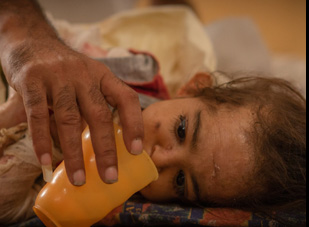
Stephen Gerard Kelly: There were certain pivotal moments in the lives of the participants that really signaled where the film was best set to go. For example, in the case of Sanaa, who got engaged, I had been filming more with her younger sister and the relationship that she had with her father. And when the engagement bomb dropped, I realized that the camera needs to focus on her now more than it did on Hanan. And in the case of Rabia, whose daughter was born with epidermolosis bullosa, caring for her sick child and managing to keep the family together and moving forward, she was a clear hero there. Everybody’s a hero who has to live and provide and love in those environments. but certain people, when I was with them, shined through more and that is what guided the edit.
The production also covers this period of time in which there were many major events such as the port explosion and COVID, which are acknowledged and not diminished, but also never a focus. Was that much of a decision?
Garry Keane: We had lots and lots of debates about it, for sure. The port explosion especially, Stephen had shot, and you can see some material of the guys watching it on their phone and experiencing it from a little bit of a distance, and certainly they felt great empathy for the victims of the blast and for the damage done. But as they say, their concerns are different concerns. Their concerns are living day by day and feeding their families and trying to eke out an existence in their own worst possible circumstances. So we decided collectively fairly quickly that [those major events for the country] were going to have a place, but a very small place, because the thrust of the story and the whole nature of what we were trying to achieve was to let the audiences into these lives in this intimate way and to experience what it’s like to live there on a day-to-day basis — the struggles, tribulations and non-access to services and no citizenship and what comes from that.
The coronavirus, when myself and Stephen went back in to film [together], I think we got COVID on the first day we landed because there was no masks and people were just going to take it as it comes and whatever happened happened because they knew in their heart of hearts that nobody was going to come and save them anyway regardless. So we kept it in its place in terms of the overall narrative, and I think that was the right thing to do.
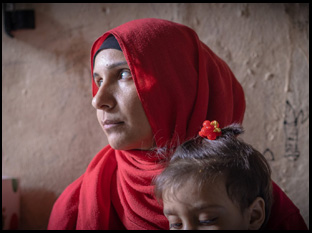
Stephen Gerard Kelly: It’s been a roller coaster. It hasn’t been easy. I’ve learned how independent film is in a stage of flux. Certainly cinema and streaming have both gone nearly in opposite directions, but to focus on the film itself and the journey it’s had, it’s been ups and downs. There are disappointments when certain festivals pass on it, but I also recognize that there’s thankfully a wealth of incredibly talented filmmakers out there making great films as well, so programmers can’t always program everything that they that they would like to.
Certain festivals were great. Woodstock was a real highlight for me. Spending time in New York City and upstate, there was a familiarity there and a comfort. Then Galway Film Festival was great and it was great to bring it to the Red Sea Film Festival. Then the being in contention for the Oscars through being Ireland’s official selection and being awarded three different awards at Doc Edge where it premiered, that attention which the Oscar name gets you, means that more people are aware of the film, and thanks to Grasshopper and others involved, it’s coming out in North America, so it’s great that the hundreds and hundreds of people who’ve messaged me, asking “Where can we see this?” they have the opportunity to watch it. And I hope that they do. We all have busy lives, but if we can empathize and show a bit more compassion to people that we haven’t had the good fortune of meeting, that’s the power of cinema, isn’t it?
“In the Shadow of Beirut” is now on VOD, including AppleTV+




